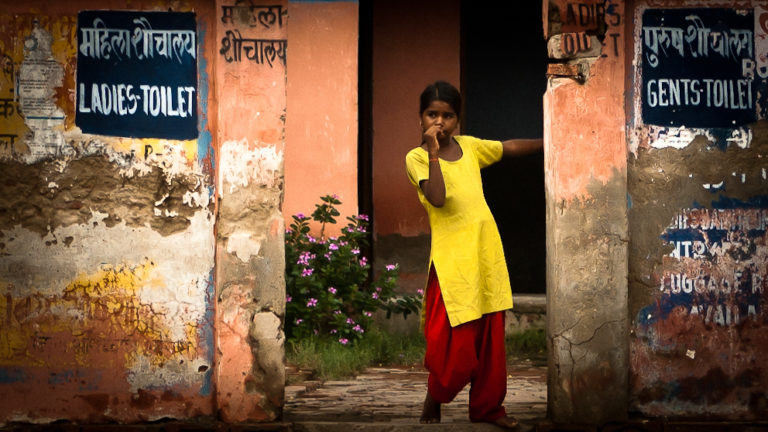When the train from Delhi sets off to the north of India, it passes by long fields at the outskirts of the capital. In the early morning, the passengers of the train can observe how dozens of men and women walk around in the field and eventually bend down to defecate. It is the daily routine of many people living in deprived areas in and outside of the city, where access to clean and safe toilets is restricted or even non-existent. The lack of privacy makes especially women more vulnerable.
Sanitation is a basic human right and WASH (Water, Sanitation, Hygiene) is the focus of the UN’s Sustainable Development Goal No. 6. However, access to clean water and a clean toilet in a protected space cannot be taken for granted everywhere. According to the World Health Organization (WHO) 60 percent of humanity do not have access to clean and safely managed sanitation services. In India about 665 million people in India, which is about half the population, lack access to latrines. The South-Asian country has the highest number of people in the world doing “open defecation”, meaning toileting in the public. Of course, having to satisfy one of the most private basic human need in front of an audience and without clean water has serious consequences for the health, safety and dignity of all the people concerned. Especially for the 300 million Indian women toileting in the open field while being exposed to everyone close by is a huge risk. Many of them get up before dawn or wait until the night in order to toilet privately and minimize the risk of harassment, sexual violence, and rape. Having to ‘hold back’ for several hours impacts women’s health drastically and heightens their level of stress, in particular when dealing with menstrual hygiene.
Ensuring access to clean water and protected toilets is especially important in schools. Education is the driving force in girls’ and women’s empowerment but is often impeded by insatisfactory sanitation: Menstruation is a taboo topic in many countries (see the article “Menstruating in the 21st Century” published earlier on the blog), but if access to clean water and protected toilets is not guaranteed, girls do not feel safe coming to school while menstruating and will stay away or even drop out. Even if toilets are installed, but gender-separation is not ensured, girls might avoid school or their families keep them at home. According to UNICEF 50% of the schools in the least- and less-developed countries do not have adequate sanitation for girls dealing with their menstrual hygiene.
In order to break this vicious circle, taboos and cultural beliefs around sanitation practices must be changed. The situation in India has led Indian Prime Minister Narendra Modi to introduce the “Swachh Bharat Mission” – the Clean India Programme in 2014, which aims at constructing more household-owned and public-owned toilets. Reviews of the programme criticised that it does not “consult the users”. A survey was supposed to be part of the Swachh Bharat Guidelines, but apparently they seldomly reached the target group. Villagers who were supposed to use the toilets were not asked concerning location, design or operation of the toilet. Neither had anyone briefed them on the health risks of open defecation. And so, the public toilets remain unused.
Women are one important group of users. Indian women have developed a strategy on their own that seems to surpasse Modi’s programme: The movement “No loo? No I do” encourages women to refuse to marry into families that do not have a toilet. Since the movement started in 2007, 1.4 million toilets have been built in the northern state of Haryana. The issue has also recently become present in Indian popular culture: the movie “Toilet, a love story” addresses the severe health issue in the well-known Bollywood-style.
Actors in global development have recognized that women themselves have a local impact: According to the UN, many women are responsible for the hygiene of the family and hence play an important role in the promotion of sanitation – this means that they can be the key for a sustainable improvement of sanitation. Many programmes in international cooperation seek to involve women in the planning so that the situation can be changed accordingly. The so-called “gender-mainstreaming” in UNICEF country programmes aims at addressing gender in developing, planning, implementing, and evaluating of projects and can thereby promote equal rights and strengthens women’s participation in the political, social and economic life of their community. Using women’s own strength, power and knowledge is maybe one of the most sustainable weapons in the fight for clean sanitation and gender-equality – and hopefully the current Bollywood movie makes a truthful prediction: “Toilet – will change India forever”.


